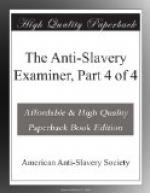If we should pursue our studies and arrange our arguments—if we should explain words and interpret language—under such a bias, what must inevitably be the results? What would be the worth of our conclusions? What confidence could be reposed in any instruction we might undertake to furnish? And is not this the way in which the advocates and apologists of slavery dispose of the bearing which primitive Christianity has upon it? They first ascribe, unwittingly, perhaps, to the primitive churches; the character, relations, and condition of American Christianity, and amidst the deep darkness and strange confusion thus produced, set about interpreting the language and explaining the usages of the New Testament!
“SO THAT YE ARE WITHOUT EXCUSE.”
Among the lessons of instruction which our Savior imparted, having a general bearing on the subject of slavery, that in which he sets up the true standard of greatness, deserves particular attention. In repressing the ambition of his disciples, he held up before them the methods by which alone healthful aspirations for eminence could be gratified, and thus set the elements of true greatness in the clearest light. “Ye know, that they which are accounted to rule over the Gentiles, exercise lordship over them; and their great ones exercise authority upon them. But so shall it not be among you; but whosoever will be great among you, shall be your minister; and whosoever of you will be the chiefest, shall be servant of all.” In other words, through the selfishness and pride of mankind, the maxim widely prevails in the world, that it is the privilege, prerogative, and mark of greatness, TO EXACT SERVICE; that our superiority to others, while it authorizes us to relax the exertion of our own powers, gives us a fair title to the use of theirs; that “might,” while it exempts us from serving, “gives the right” to be served. The instructions of the Savior open the way to greatness for us in the opposite direction.




